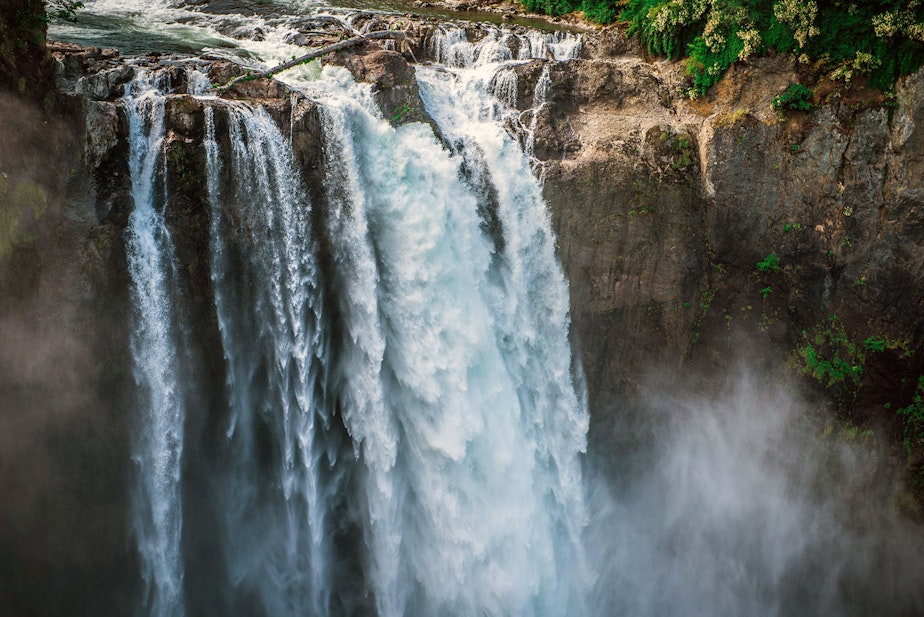Why the Snoqualmie Indian Tribe seeks regulation of popular falls airspace

At least one local helicopter tour company will no longer take customers over Snoqualmie Falls, out of respect.
The Snoqualmie Indian Tribe wants air tourism to stay away from the sacred site, a 268-foot waterfall, and has asked the federal government to step in.
Snoqualmie Falls is a popular tourist destination, with its scenic views and trails. But its popularity has also attracted planes, helicopter tours, and drones that hover above the falls. The Snoqualmie Indian Tribe says aircraft are upsetting tribal members who come to the falls to connect to their ancestors.
“I think that people can easily see the significance of this place, whether or not they understand the significance to a Snoqualmie tribal member,” says Snoqualmie Indian Tribe Assistant Director of Governmental Affairs and Special Projects McKenna Sweet Dorman.

The falls are a place for her people to practice their beliefs.
“For our people, this is our center, we are sdukʷalbixʷ,” she says. “We are the Transformer’s people. This is our most sacred site.”
Sponsored
Snoqualmie Falls
You can hear the roar of Snoqualmie Falls before you see it. As you get closer, mist from the water hitting the plunge pool below feels like a light rain. The Snoqualmie say the mist carries prayers to their ancestors.
This sacred site is surrounded by hiking trails. Overlooking the falls is a resort, spa and two restaurants. And there’s an apiary, where honey is sourced and drizzled from high above biscuits (to represent the falls) served at the resort. Tourists flock to the area, and some even pay upwards of $200 per person to see Snoqualmie Falls from the air.
Deputy Secretary of the Snoqualmie Tribal Council, Christopher Castleberry says the tribe’s concerns are about respect for the land and its people.
“I think the goal is government intervention, to be able to hear our concerns and have that communication to find a compromise,” Castleberry says.
Sponsored

The fight over air regulation
Right now, there are no air regulations above the falls and the tribe wants that to change both for the tribe and guests.
Tyson Horner recently traveled to the falls from Monroe with his family.
"The natural beauty is kind of spoiled by man's technology," he says. "So, as much as we can keep it the way it was, the better it would be."
Sponsored
It’s that natural beauty the Snoqualmie Indian Tribe wants to preserve with the government's help.
The resort and much of the surrounding land has been owned by the tribe since 2019.
Rob Roy Smith, the tribe’s legal counsel with Kilpatrick Townsend & Stockton LLP, says they’ve tried for years to resolve the flight disruptions on their own.

"The tribe reached out to three helicopter companies letting them know that operating their helicopters at low altitudes, and without the tribe’s permission, was disrespectful and distracting," Smith says.
Sponsored
Last year, the tribe asked the Federal Aviation Administration to monitor air traffic and flight altitudes; low-flying is characterized as 500 feet or less, but helicopters have no minimum in unregulated airspace.
The FAA declined to be interviewed for this story.
In a statement, an FAA spokesperson said it’s “aware of the concerns. The Department of Transportation and the FAA works with all of our Tribal partners and looks forward to working with all parties to consider available options.”
The Snoqualmie Indian Tribe met with representatives from the FAA, US Department of Transportation and the Bureau of Indian Affairs in late January. Officials told the tribe it may take three to five years to set new flight regulations over the falls.
Atomic Helicopters community centered focus
Sponsored
Sara Andersen is the general manager and charter director for Atomic Helicopters in Seattle, one of the companies that have offered tours over the falls.
She says it's been one of her favorite experiences — it's "magical." But among customers, it was actually the company's least popular tour.
She says she heard from the FAA last year, but not the Tribe. In fact, she says it wasn’t until December, when she began to receive angry emails from the public and was contacted by a KUOW reporter, that she knew there was a problem.
"I was just completely heartbroken," she says. "No one stopped by the office. No one emailed, called, nothing. So, to immediately hear this news about how we were being disrespectful to the Tribe, from an outside source, like I said, it was just such a blow."
Andersen alerted her boss at the company, and the tours above Snoqualmie Falls stopped. Now, they're no longer offering flights over the falls, out of respect for the Tribe.
"Keeping good relations with the community has always been a top priority [for] us," she says, adding tourists come and go while the Tribe is here to stay. "Being respectful to our neighbors is very important, especially in sacred spaces."
Two other helicopter companies that offer tours over the falls did not respond to a request for comment.
Andersen's been hurt to receive some "very angry emails" and hear from people who accused the company of willfully disrespecting the Tribe. She understands why the Tribe wants these flights to stop, and she agrees they should stop.
"We all live on one planet. It seemed like the right thing to do to just stop operations," she says, adding the company would be willing to work with the Tribe to educate guests if members ever wanted to collaborate. "But until that day comes, we will avoid that area and let them peacefully worship ... There's many other beautiful spots in the Pacific Northwest [where] we're welcome to fly and that we'd love to share with our guests up in the air."
Correction Feb.2, 2022: The original broadcast version of this story incorrectly referred to Sara Andersen as Sara Henderson. This story has been updated to correct this error.




